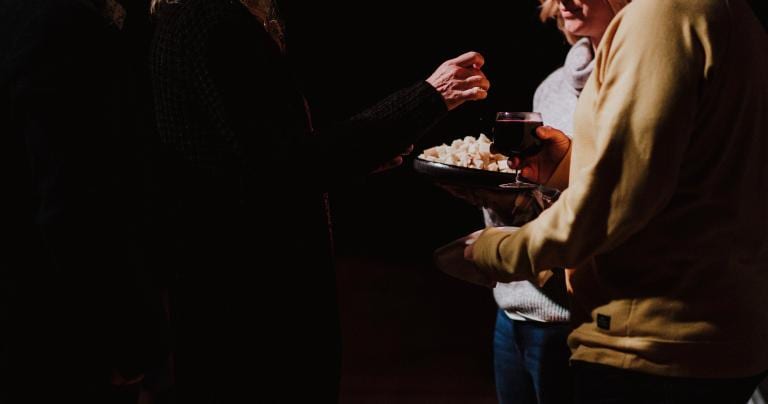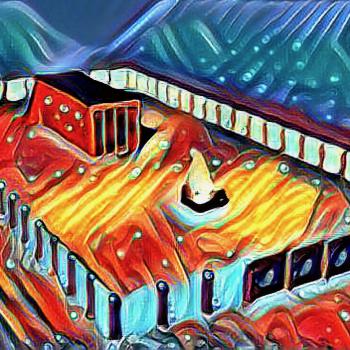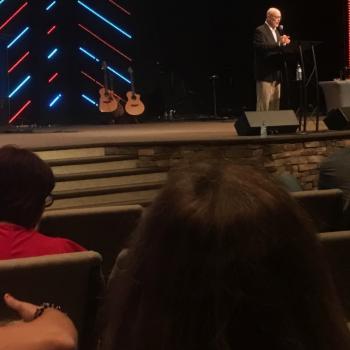Which was the more developed position on the role of the elements in conveying the presence of Christ in the Eucharist, Justin Martyr or Irenaeus? [1]
There are a couple of considerations for this question. First of all, Irenaeus of Lyons is the student of Justin Martyr so it is possible that the thoughts of Irenaeus are simply a natural development of Justin’s work.
Secondly, while one can argue that Irenaeus writes more, and perhaps writes more articulately, Justin bears a great influence on both the Western and Eastern Churches.
This is the second in a brief series on communion. What do prominent church leaders think? To read my first article Martin Luther, Justin Martyr, & Heidelberg at “The Table” CLICK HERE

Justin Martyr on Communion
i. Justin Martyr on communion
Let us first look at an impactful quote from Justin in Apology:
For we do not receive them [Eucharistic elements] as ordinary food or ordinary drink; but as by the word of God, Jesus Christ our Saviour took flesh and blood for our salvation, so also, we are taught, the food blessed by the prayer of the word which we received from him, by which, through its transformation, our blood and flesh is nourished, this food is the flesh and blood of Jesus who was made flesh.[2]
Justin employs the language, “word of God, Jesus Christ our Saviour.” Word, or logos in the Greek, is an idea traced back to Johannine usage of the term, to Philo, and to the Greek philosophers. Logos is the creative force or wisdom, which John links to Christ. Justin emphasizes Christ’s involvement in the Eucharist.
He uses the phrase “through its transformation.”
Is this the transformation of the elements?
Or is Justin referring to the transformation of “blood and flesh”?
ii. Different translations of Justin
On this point, Henry Bettenson and Bard Thompson seem to translate Justin differently. Focus on the location of the word transformation in their translations.
Bettenson states that Justin says:
the food blessed by the prayer of the word which we received from him, by which, through its transformation, our blood and flesh is nourished, this food is the flesh and blood of Jesus who was made flesh.
Bettenson seems to leave the door open for a transformation of the elements.
On the other hand, Thompson translates Justin thus:
the food, “eucharized” by the formula of prayer which comes from Him, and from which our flesh and blood are nourished by transformation, is the flesh and blood of that incarnate Jesus.[3]
Thompson seems to open the door open for a transformation of our bodies.
iii. Unanswered questions
The question arises from translation, does Justin purport a physical presence of Jesus in the bread and wine?
Perhaps this is a technical question beyond the scope of this article. However, it appears that Justin does not fully develop the position. Whether the transformation is of the elements or of our physical bodies, it is Jesus who is doing the transforming, so He is indeed present in the ordinance.
A related question is what does this imply for Christ’s healing work in atonement?
“Our flesh and blood are nourished by transformation.”
Is Christ healing in these moments?
iv. Justin the older witness
The profound contribution of Justin is that he seems to view the Eucharist as both genuine thanks and also recalling:
Justin stated that the bread and wine were consecrated . . . in which case the elements were blessed after the example of the Lord, who took bread, gave thanks, and said, Do this for my anamnesis . . . he conceived the Eucharistic prayer to be essentially “thanksgiving,” and he referred to the consecrated elements as having been “eucharized” – “thanked upon.”[4]
In Justin we find the rudimentary beginnings of both recalling and thanksgiving. Thompson goes on to say: “It was an anamnesis, a re-calling of Christ’s passion, indeed of the whole incarnation.”[5]
Justin precedes both Eastern and Western thought as “an older witness.”[6].
He [Justin] speaks of the eucharist as the “pure sacrifice” of christians, as well for the “re-calling” (before God, anamnesis) . . . the memorial (memnetai) of the passion.[7]
v. What’s our focus?
Are we focusing on different views that we have about communion today, that may not have been considered by leaders like Justin Martyr in the Primitive Church?
Does the Holy Spirit transform the elements or us? Justin does not completely answer this question, but he does address the other two questions.
Is it enough to approach the table with a genuine, and perhaps blessed, memory of the Cross? This is recalling and memorial.
Is it enough to remember that the term Eucharist means thanksgiving? Perhaps we should center ourselves with a gratitude for all that Christ accomplished for us.
Look for the next article on the views of Justin’s student, Irenaeus of Lyons.
notes:
[1] The professor asked this question as one of many options for us to choose from in a seminary course. Jared V. Ingle, “Question 5” (paper presented at Asbury Theological Seminary: Sacraments in History, Wilmore, KY, November 18, 2016).[2] Henry Bettenson and Chris Maunder, eds., Documents of the Christian Church, 4th ed. (New York, NY: Oxford University Press, 2011), 71.
[3 – 5] Bard Thompson, Liturgies of the Western Church (Philadelphia, PA: Fortress Press, 1980), 6-8.
[6 – 7] Dom Gregory Dix, The Shape of the Liturgy, 3rd ed. (New York, NY: Bloomsbury T&T Clark, 2015), 116.












